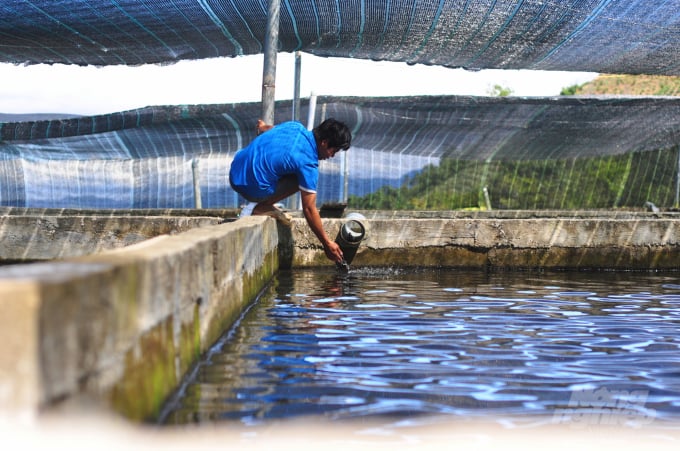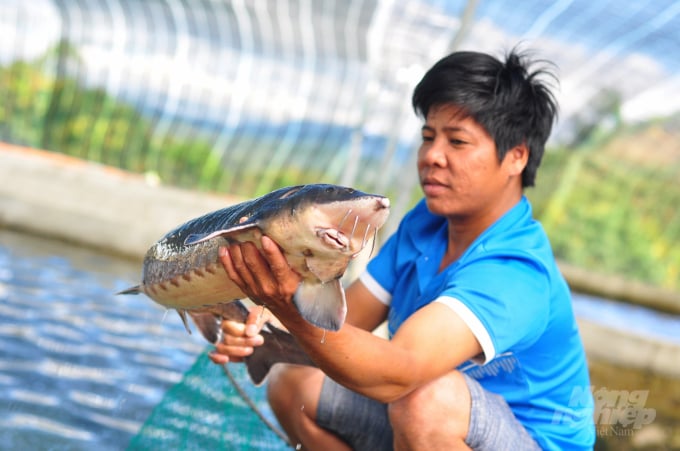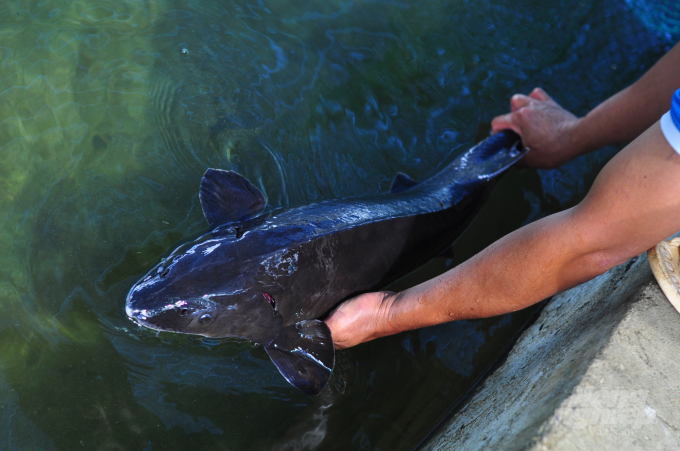May 29, 2025 | 18:28 GMT +7
May 29, 2025 | 18:28 GMT +7
Hotline: 0913.378.918
May 29, 2025 | 18:28 GMT +7
Hotline: 0913.378.918

Lam Dong has attained high profit in recent years thanks to the cold-water fish farming model. Photo: Minh Hau.
Lam Dong has an average altitude of 600 - 1,500 m above sea level and an average temperature of 18 - 24oC. These are favorable conditions to grow cold water fish varieties, especially sturgeon.
The province has 25 farms and 35 households raising sturgeon with a total farming area of 50 ha, concentrated in Lac Duong, Dam Rong, Di Linh and Da Lat. Farmers here usually build cement tanks, use composite tanks or dig ponds then lined them with tarpaulin.
Mr. Pham Phi Long, Director of Lam Dong Sub-Department of Livestock, Veterinary and Fisheries, said that so far the province has had a master plan for the development of cold-water fish farming. Local cold water fish products have been granted a trademark registration certificate by the National Office of Intellectual Property (Ministry of Science and Technology).
Grand cold-water fish farming enterprises such as Viet Duc Sturgeon Cooperative (Dam Rong district), Vietnam Sturgeon JSC, Phi Huynh Co., Ltd (Da Lat), and Ngoc Mai Trang Co., Ltd has actively invested in seed production equipment, imported seed eggs for hatching and rearing of fry, basically meeting the demand for fingerlings in service of the province’s commercial fish production.
These facilities produce approximately 1.5 - 2 million breeding stock each year. The output of cold-water fish in Lam Dong is currently estimated at 1,200 - 1,400 tons/year, mainly consumed in Ho Chi Minh City and provincial marketplaces

The output of cold-water fish in Lam Dong is currently estimated at 1,200 - 1,400 tons/year. Photo: Minh Hau.
In addition to commercial sturgeon production, a number of businesses such as Dai Duong Stream Fish Co., Ltd and Phi Huynh Co., Ltd also focus on developing specialized sturgeon varieties to process high-quality products. Caviar is considered one of the high-end product lines that bring great profits. The output of black caviar at present is estimated at approximately 1.5 tons/year. the canned caviar processing technology is becoming more and more perfect, meeting the increasing demands of the consumption market.
Mr. Pham Phi Long shared that the chain linking production and consumption of cold-water fish products in Lam Dong has operated quite effectively up to now. The locality has formed a chain from seed production, commercial fish farming, food supply and market consumption organizing.
“Units participating in the link chain all come up with appropriate strategies to stably develop output, following the annual plan. The output is released and purchased at farms according to the production cycle and plans with a reasonable price. The link chain host develops commercial farms and is responsible for underwriting products for farms. This leads to the establishment of a stable supply system."

Lam Dong aims to develop high-tech cold-water fish farming models. Photo: Minh Hau.
Lam Dong will continue to maintain high-tech farming areas in the near future. At the same time, the province will focus more on promoting research and application of technical measures to the high-yield, high-quality seed production in consideration to the regional climatic and water conditions. The agricultural sector will also strengthen disease control and prevention as well as environmental forecasting, expand the farming areas and increase the number of cages in reservoirs and irrigation dams.
The province aims to build a cold-water fish farming development area suitable to climate conditions and water sources, minimizing adverse impacts on the environment, especially natural forests. The research and creation of hybrids capable of adapting to high-temperature water conditions will help develop and expand the cold-water fish farming area in the vicinity of Da Lat and Lac Duong.
According to Lam Dong Sub-Department of Livestock, Veterinary and Fisheries, fish eggs are still imported from abroad, so the price of seedlings is high, not to mention that the fish feed must also be imported from faraway provinces and cities.
Businesses will therefore continue to research broodstock farming to produce eggs on their own in the future. They will also devise plans to invest in aqua feed factories so that the cost of seed production can be reduced, leading to lower product costs, higher competitiveness, and improvement in terms of economic efficiency for cold-water fish farming models in the area.
Translated by Samuel Pham
/2025/05/25/4127-3-073637_820.jpg)
(VAN) Thanks to the promotion from an FAO-implemented project, vegetable production in greenhouses in Moc Chau has seen strong development, from 1.5 hectares in 2021 to nearly 50 hectares in 2024.

(VAN) FAO has recently supported USD 140,000 to implement the project 'Risk mitigation human-animal interface risks through disease control initiatives in pig farming.'

(VAN) The People's Committee of Tra Vinh province has approved an adjustment to the investment policy for the Green Hydrogen Plant project, increasing its area to approximately 52.76 hectares.
![Reducing emissions from rice fields: [2] Farmers’ commitment to the soil](https://t.ex-cdn.com/nongnghiepmoitruong.vn/608w/files/news/2025/05/05/dsc08881jpg-nongnghiep-140632.jpg)
(VAN) Clean rice cultivation model in Thuong Tan commune, Bac Tan Uyen district, is assisting local residents in achieving sustainable agriculture by substantially reducing costs, increasing productivity, and protecting the environment.

(VAN) At the conference to disseminate Resolution No. 68, AgriS introduced its digital agricultural ecosystem and reaffirmed its commitment to accompanying the Government in promoting private sector development and sustainable agriculture.

(VAN) 'Blue Ocean - Blue Foods' initiative is designed to restore marine ecosystems and establish sustainable livelihoods for local communities by cultivating a minimum of 1,000 hectares of cottonii seaweed in the first three years.
/2025/05/21/4642-3-112707_603.jpg)
(VAN) The V-SCOPE project has made direct contributions to three out of six pillars of the Comprehensive Strategic Partnership between Vietnam and Australia.